|
|
|
Sort Order |
|
|
|
Items / Page
|
|
|
|
|
|
|
| Srl | Item |
| 1 |
ID:
061046


|
|
|
| 2 |
ID:
185945
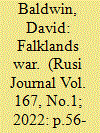

|
|
|
|
|
| Summary/Abstract |
The genesis of this article was my relating to a fellow Falklands veteran some 39 years later the experiences of repatriating Argentine POWs, and soon after, taking up his suggestion to ‘commit to paper to add to the “Corporate memory”’. And as I look back and reflect, I see that what we faced was a unique, untried and untested situation for which there was no recent operational precedent. I am not a ‘diary person’, but my memories of these events are still sharp and vivid. And although I now realise with hindsight the challenges and potential pitfalls, at that time it was a matter of just ‘get on and sort it as best we can with what we’ve got’, and yes, with pooling joint experiences and much common military sense, we effectively ‘winged it’, soon hitting on the solution that worked. I also remember well the many debriefs from the hordes of experts that descended on the Canberra during our return voyage home – on the many and varied subjects of battle procedure, weapon and equipment performance, minor tactics, command and control and so on, but strangely, and it never occurred to me at the time, I cannot recall any debrief on POW handling, so maybe these recollections can now be added to all those other official accounts…
|
|
|
|
|
|
|
|
|
|
|
|
|
|
|
|
| 3 |
ID:
028284


|
|
|
|
|
| Publication |
Dehra Dun, Natraj publishers., 1974.
|
| Description |
xx, 267p.
|
|
|
|
|
|
|
|
|
|
|
|
Copies: C:1/I:0,R:0,Q:0
Circulation
| Accession# | Call# | Current Location | Status | Policy | Location |
| 014578 | 341.65/GEN 014578 | Main | On Shelf | General | |
|
|
|
|
| 4 |
ID:
028107
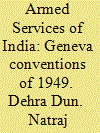

|
|
|
|
|
| Publication |
Dehra Dun, Natraj Publishers, 1984.
|
| Description |
xii, xx, 267p
|
|
|
|
|
|
|
|
|
|
|
|
Copies: C:1/I:0,R:0,Q:0
Circulation
| Accession# | Call# | Current Location | Status | Policy | Location |
| 025118 | 341.65026/GEN. 025118 | Main | On Shelf | General | |
|
|
|
|
| 5 |
ID:
047436
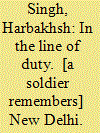

|
|
|
|
|
| Publication |
New Delhi, Lancer Publishers and Distributors, 2000.
|
| Description |
x, 440p.Hbk
|
| Standard Number |
8170621062
|
|
|
|
|
|
|
|
|
|
|
|
Copies: C:1/I:0,R:0,Q:0
Circulation
| Accession# | Call# | Current Location | Status | Policy | Location |
| 043344 | 923.554/SIN 043344 | Main | On Shelf | General | |
|
|
|
|
| 6 |
ID:
133513
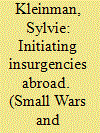

|
|
|
|
|
| Publication |
2014.
|
| Summary/Abstract |
Secret French plans to launch guerrilla-style raids on the British Isles devised in the spring of 1796 were referred to as 'chouanneries'. The name and concept behind these small-war operations were modelled on the irregular tactics used by the Chouan rebels in the Vendée, which the French state army had brutally quashed, but some wished to transfer into their institutional practice. Part of France's ongoing military strategy in the war against Britain, which included fomenting insurrection in Ireland, these irregular operations were to be manned partially by pardoned deserters and released convicts and prisoners of war. Of these, only Tate's brief invasion of Wales in 1797 was realised, but the surviving plans provide insightful historical lessons into an Anglophobic mindset shared by a small network of practitioners and policy deciders on the effectiveness of such shock and awe tactics. Largely motivated by the desire to take revenge for Britain's support of counter-revolutionaries in the Vendée, these plans could more aptly be referred to as counter-'chouanneries'.
|
|
|
|
|
|
|
|
|
|
|
|
|
|
|
|
| 7 |
ID:
030010


|
|
|
|
|
| Publication |
London, Sussex University Press, 1972.
|
| Description |
xiii, 283p.Hardbound
|
| Standard Number |
0435821911
|
|
|
|
|
|
|
|
|
|
|
|
Copies: C:1/I:0,R:0,Q:0
Circulation
| Accession# | Call# | Current Location | Status | Policy | Location |
| 010961 | 365.48/DIC 010961 | Main | On Shelf | General | |
|
|
|
|
| 8 |
ID:
190718
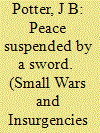

|
|
|
|
|
| Summary/Abstract |
Breaker Morant dramatizes the historical trial of a trio of Australian lieutenants who were court-martialed for executing unarmed prisoners during the Second Boer War. The midpoint turned culmination of New Australian Cinema, this film serves as an instructive case study in how soldiers justify harsh acts of violence to themselves and others. The primary mouthpieces for such explanations are the title character and the defense attorney, Major Thomas. This article argues that these justifications are rooted in factors that both men cite repeatedly – the conduct of the enemy, the chain of command, and the nature of the conflict itself.
|
|
|
|
|
|
|
|
|
|
|
|
|
|
|
|
| 9 |
ID:
095275


|
|
|
|
|
| Publication |
2010.
|
| Summary/Abstract |
Despite recent attention, the Korean War (1950-53) remains underappreciated and further explanation of its 'forgottenness' is needed. Korea originally faded to gray because there was no satisfying victory. National security planners had ample reason to try and rehabilitate the war in the mind of the public, but had little success. This was because a primary accomplishment of the second half of the war - forcing the enemy to accept so-called voluntary repatriation of POWs (prisoners of war) - was semi-secret and never declared as a major war aim. Since the nation was never united around securing voluntary repatriation, there was little raw material for creating a memory of success.
|
|
|
|
|
|
|
|
|
|
|
|
|
|
|
|
| 10 |
ID:
142084


|
|
|
|
|
| Summary/Abstract |
This article discusses the sovereignty concerns of the government of the Lao People’s Democratic Republic (LPDR) ahead of a 1985 joint cooperation agreement with the United States to account for US Prisoners of War/Missing in Action (POW/MIA) lost in Laos during the Vietnam War. It attempts to demonstrate that from the Laotian side, domestic security concerns and diplomatic factors were the main drivers of cooperation with the United States. The domestic security factor was the perceived threat of violence arising from American-supported subversive activities conducted by Thailand-based anti-LPDR resistance groups as well as private groups searching for alleged live POWs inside Laos. The diplomatic factor stemmed from Laos’ desire for the United States to respect the country’s independent foreign policymaking vis-a-vis its ally Vietnam. Drawing on primary sources, this article posits two arguments: first, the LPDR wanted to use the 1985 joint cooperation agreement to obtain compliance from the United States to end its support for both anti-LPDR resistance groups and private POW searchers; and second, to utilize POW/MIA negotiations with Washington to reaffirm Laos’ sovereignty vis-à-vis Vietnam.
|
|
|
|
|
|
|
|
|
|
|
|
|
|
|
|
| 11 |
ID:
146803
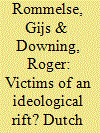

|
|
|
|
|
| Contents |
Dutch prisoners from the sea battles of the First Anglo-Dutch War of 1652–1654 were held in England under generally inhumane conditions. It has recently become accepted that ideological differences, as much as commercial, led to the deterioration in relations that led to the conflict. English public opinion had been inflamed by a vicious anti-Dutch propaganda campaign, suggesting that ideological demonization could provide the explanation for the dire treatment to which the prisoners were subjected. It is concluded, however, that logistical problems associated with their reception, plus the chronic lack of money of Cromwell’s regime, provide a sufficient explanation.
|
|
|
|
|
|
|
|
|
|
|
|
|
|
|
|
| 12 |
ID:
115726


|
|
|
|
|
| Publication |
2012.
|
| Summary/Abstract |
The treatment of prisoners varies enormously across wars. Why are some prisoners horribly abused, while others are cared for humanely? The author argues key attributes of the belligerents, alongside the nature of the conflict itself, provides the most convincing explanation for differences in prisoner abuse. Democratic norms and domestic institutional incentives lead democracies to exhibit more restraint when dealing with prisoners. On the other hand, states caught up in drawn-out wars of attrition, or those seeking territorial conquest, are much more likely to resort to prisoner abuse. The author tests this argument against a variety of common alternative explanations using a new data set on prisoner abuse across all interstate wars from 1898 to 2003. The author finds strong support for the role of both the regime type and the nature of the conflict, while the results also suggest several points of difference from existing research on wartime conduct.
|
|
|
|
|
|
|
|
|
|
|
|
|
|
|
|
|
|
|
|
|